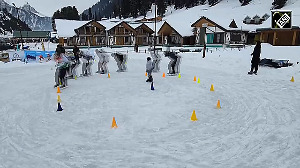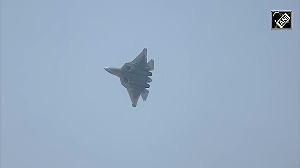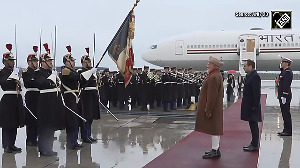


Thank god!" said Tayyaba Sajjad as she emerged from the cardiac intensive care unit where her two-year-old daughter Noor Fatima lay. "She is recovering."
Noor is lucky. But not six-month-old Babbar who arrived from Pakistan at the Narayana Hrudayalaya (Hospital for Heart Problems) on the outskirts of Bangalore for much-needed surgery.
Noor, who crossed over into India from Lahore by the Sada-e-Sarhad bus on its maiden journey, and Babbar shared a similar heart condition, which saw the girl undergoing surgery from 7 am on Tuesday morning.
Over the next five hours, paediatric cardiothoracic surgeon Dr Rajesh Sharma sealed two gaping holes in her heart -- and now she is fine, recovering satisfactorily, though she will have to stay in the ICU for another two days.
But Babbar died of pneumonia even before the doctors could operate, in the early hours of Wednesday. Unlike Noor, he arrived in Bangalore before the Indo-Pak friendship bus service was reinitiated.
This meant he had to fly from Pakistan to Dubai, then to Mumbai and finally to Bangalore -- a two-day journey on which he contracted pneumonia and arrived at the hospital considerably weakened.
His death, and the media attention that followed, seem to have forced the doctors to operate on Noor a day before schedule.
 Noor's father Nadeem Sajjad said the family started out on the night of July 11. The bus journey took eight hours to Delhi. From there, they flew to Bangalore, and were at the hospital by Saturday noon.
Noor's father Nadeem Sajjad said the family started out on the night of July 11. The bus journey took eight hours to Delhi. From there, they flew to Bangalore, and were at the hospital by Saturday noon.
Noor had her pre-op tests on Sunday. The results were in by Monday, and the surgery was scheduled for Tuesday.
The surgery was completed in a single phase by Dr Sharma's team, which included Dr Devi Shetty, the founder and head of Narayana Hrudayalaya.
Since Dr Sharma joined the hospital a couple of years ago, it has on an average seen three to four Pakistani children. Thus, over 60 Pakistani children have been treated at the hospital till now for heart conditions similar to Noor's -- only hers was more complicated as the blood supply to her lungs was obstructed.
"It all started with a 21-day baby with a serious heart defect who came to see me at the All India Institute of Medical Science [in New Delhi]," said Dr Sharma.
A product of AIIMS all through, Dr Sharma had done his MBBS, MS and super-specialisation in cardio thoracic surgery from there. After a two-year stint in Boston, Miami, he returned to AIIMS in 1991 and worked there till 2001.
Paediatric cardiac surgical care, he said, is very expensive in Pakistan. And so the baby was first referred to a doctor in the US, who referred her to Dr Sharma.
The baby was brought over, Dr Sharma operated successfully, and his fame spread in Pakistan, through patient-to-patient referrals.
"I never expected my Pakistani patients will follow me all the way here," says Dr Sharma. "The hospital expenses may not be greater, but travel certainly is.
"The patients who followed me here wrote to me and asked when they could meet me at AIIMS. I told them I had moved to a private hospital in Bangalore. They responded saying, we would be happy to come wherever you are!"
The doctor had been corresponding by email with the Sajjads for quite some time, and was familiar with Noor's case. This made it easier to operate on her quickly.
"I always make sure I give my Pakistani patients priority," Dr Sharma said. "I usually operate on them as soon as they come, knowing it is expensive and difficult for them to stay long in a strange place."
"They are often far more friendly than my Indian patients," he added, "and more grateful for whatever medical attention we give them."
For the one Babbar who didn't survive, there have been many who endured the long journey that was the only option earlier. Take, for example, Umair, the one-year-old son of Mohammed Aslam from Karachi, who flew from Pakistan to Mumbai more than a year ago, and is back home fine and fit.
Aslam and his family could only afford second-class train fare from Mumbai to Bangalore. "We had heard, back in Pakistan, that Dr Sharma was the man to trust with our son's life," Umair's mother Salma told rediff.com then.
Before New Delhi's recent handshake with Pakistan, when visas to India were hard to come by, parents waited weeks on end to bring Dr Sharma their wards. Then, the letters the doctor issued often helped speed up the process.
"I verify the cases are genuine," Dr Sharma said, "and give them letters ratifying they need genuine medical care, and should be permitted to come down to India to see me."
With Indo-Pak relations on the mend now, does the doctor anticipate more Pakistani patients coming to him?
"I should think so!"
Photographs: Prakash Singh/AFP/Getty Images






 © 2025
© 2025